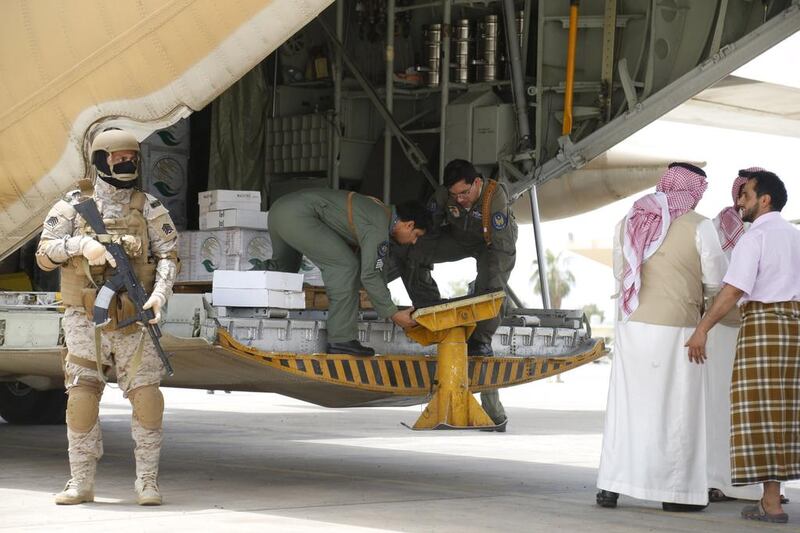ADEN // An Emirati plane landed in Aden at dawn on Friday, bringing humanitarian aid to the southern Yemeni city only hours after its airport came under rocket fire from rebels.
In total, four aircraft have arrived at the port city since the symbolic reopening of Aden’s international airport on Wednesday, which followed nearly four months of fierce fighting.
The UAE plane delivered medical supplies from the UAE Red Crescent before departing, an airport official said. A Saudi plane also landed at midday, carrying 12 tonnes of humanitarian assistance and a team from the King Salman Centre for Relief and Humanitarian Works. It was the third Saudi aircraft to arrive at the airport since its reopening.
Rafat Al Sabbagh, a spokesman for the King Salman Centre, said that the flight carried medical supplies for cancer patients and hospitals and was coordinated with the Yemeni government’s relief commission.
A vital supply artery for war-torn South Yemen, the facility came under fire from the Iran-backed Houthi rebels on Thursday as another Saudi plane was unloading humanitarian aid on the tarmac.
The airport was recaptured on July 14 by Gulf Arab-backed Yemeni forces as they drove the Houthis out of the southern port city and much of the surrounding areas.
Houthi fighters allied with army units loyal to former president Ali Abdullah Saleh captured Aden in March and April at the outset of the country’s four-month-old war, dealing a blow to president Abdrabu Mansur Hadi, who is recognised internationally as the country’s legitimate leader.
Mr Hadi and his aides fled to Riyadh as Houthi forces, who had seized the capital in September, closed in on Aden.
A Saudi-led coalition of Arab states, including the UAE, has been bombarding Houthi forces since late March in a bid to reinstate Mr Hadi. It has also run training programmes for Yemeni soldiers loyal to Mr Hadi and dropped arms to local forces fighting the Houthis.
The advance in Aden may have also benefited from efforts to weaken a key pillar of Houthi power, namely their alliance with former president Mr Saleh, who has the loyalty of army units that are probably the country’s toughest military force.
The alliance is rooted in tactics rather than ideological sympathy – Mr Saleh and the Houthis were once sworn enemies but made common cause last year against new shared enemies.
The move, typical of Yemen’s constantly shifting political landscape, gave the Houthis a decisive edge on the battlefield.
Diplomats and Yemeni politicians say that representatives of Mr Saleh, whose army loyalists laid siege to Aden alongside the Houthis back in March and April, are negotiating with diplomats from the UAE.
Adel Shuja, a leader of the party led by Mr Saleh, said that negotiations between the ex-president’s representatives and the United States, Britain and the UAE “to find a peaceful solution to the crisis ... have made significant progress so far”.
A politician from Yemen’s government said that the talks focused on the departure from Yemen of Mr Saleh, an arch survivor who balanced nimbly between rival armed and tribal groups during his three decades in office.
Despite being forced to step down in 2012 under a Gulf-brokered transition plan following mass protests against his decades of rule, Mr Saleh has remained a powerful political player operating behind the scenes, enjoying immunity under the deal.
Mr Saleh’s fortunes are now again in question. A diplomat said that Mr Saleh was “gambling, as ever, but now less for power than for survival”.
“They’re speaking to him to extract him from the country, because they realise that while he cannot again rule the country, he can still destroy it,” a Yemeni politician said.
The first plane to land at Aden airport since pro-Hadi government forces took over was Saudi, carrying weapons and military assistance.
After Aden’s recapture, Mr Hadi’s ministers are slowly returning there.
If the airport resumes regular operations then the city is expected to be able to expedite the import of badly needed emergency humanitarian aid.
Civilian suffering in Yemen has reached “unprecedented levels,” the International Committee of the Red Cross (ICRC) said on Friday, warning that intensifying violence in the country’s south was hamstringing emergency medical aid.
The ICRC voiced particular concern over worsening clashes in the southern governorates of Taez and Aden.
In Aden and Taez, “it is becoming increasingly difficult for us to reach affected areas, to evacuate the dead and the wounded and to provide life-saving assistance,” the ICRC’s mission chief in Yemen, Antoine Grand, said.
The aid group urged both pro-Hadi forces and the Houthis to let humanitarian groups work.
Heavy fighting forced a four-month closure of Aden’s international airport, what had been a vital landing point for aid headed to embattled South Yemen.
The ICRC warned that as the fighting escalated, so too did “shortages of water, food and fuel across the country”.
A boat chartered by the Red Cross and loaded with humanitarian supplies successfully docked in Aden’s port on Thursday.
The group insisted that aid should not be held hostage by the shifting situation on the ground.
“All sides must facilitate our access and respect our mandate,” it said.
Overnight, rocket attacks on Aden killed three people and wounded 57, according to Al Khader Laswar, a health official in the city.
The rockets were fired from north Aden, where the Houthi rebels still have a presence after being driven out of most of the city by fighters loyal to Mr Hadi.
Elsewhere, coalition warplanes struck rebel positions in Omran, north of the rebel-held capital Sanaa, and Dhamar in central Yemen, according to residents.
* Agence France-Presse, Associated Press, Reuters





